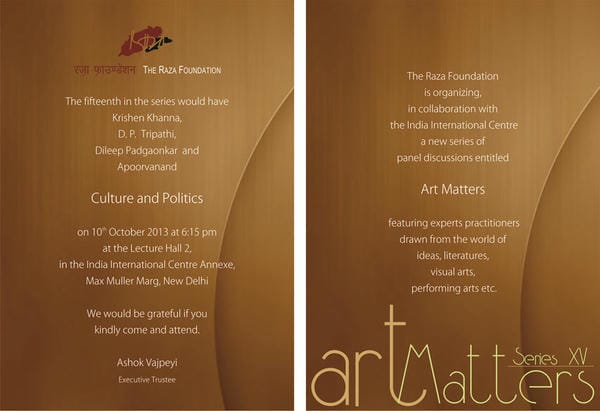
03-Oct-2013 12:00 AM
2139
The contemporary times stand witness to a constant deterioration of meaning of art and manipulation of theoretical social and political concepts as well as their practical significance. Whether they are questions as serious as social and political concerns of human rights or social exclusion affecting a dignified human survival, or as sensitive as the waning of interest in classical art forms, they call for an urgent need to revisit and discuss the prevalent conceptions.
Art has its unique way of reviving our soul from deadening monotonous routines through its multiple intricate expressions. Forming a singular perception of art or attributing a definitive meaning to it often reduces art from its fascinating complexity and expressive charm. This reductive approach confines art to its modernist understanding, which then fails to take cognizance of the artistic abstraction expressed through different forms and styles.
The Raza Foundation through its series ‘Art Matters’ provides a platform for open discussion on such issues. It endeavors not only to release the true essence of art from the clutches of definitive modernist approach in order to grasp myriad ways of extolling art, but also to stir up debate on the changing meanings of social and political theoretical concepts like rights, justice, liberty, citizenship, etc. Well known, renowned scholars and practitioners from all the diverse fields of arts, dance, music, social science, poetry, and so on are invited for this purpose.
Here, we publish the fifteenth panel discussion of ‘Art Matters’, titled ‘Culture and Politics’ featuring Krishen Khanna, D. P. Tripathi, Dileep Padgaonkar and Apoorvanand.
Krishen Khanna is an Indian artist born in Lyallpur. He attended Imperial Service College in England and is a self-taught artist. He is recipient of the Rockefeller Fellowship in 1962, the Padma Shri in 1990, and the Padma Bhushan in 2011.
Devi Prasad Tripathi was born in Sultanpur Uttar Pradesh. As a student, Tripathi was president of Jawaharlal Nehru UniversityStudents' Union, and later taught at Allahabad University as a professor of politics. He is also the editor of the quarterly journal Think India. He speaks several Indian and foreign languages, and has lectured in a number of foreign universities. Having become involved in politics at the age of sixteen, Tripathi became one of former Prime Minister Rajiv Gandhi's aides. He left the Congress Party, however, over his opposition to Sonia Gandhi, the President of the Party, becoming Prime Minister (because of her foreign origin). He joined the Nationalist Congress Party in 1999, and has reached the position of its General Secretary and chief spokesman. He was responsible for negotiating over seat-sharing in Maharashtra.
Dileep Padgaonkar was born in Pune in 1944. He matriculated from St. Vincent’s High School and graduated from Fergusson College, two of the city’s hallowed educational institutions and a doctorate in humanities from the Sorbonne in France in June 1968 before commencing upon his career in journalism. Fluent in French, he joined the Times of India as its Paris correspondent, serving it in various capacities before being appointed its editor in 1988. He held the post for six years. Mr. Padgaonkar served with the UNESCO in Bangkok and Paris from 1978 to 1986.
Apoorvanand is professor at the Hindi Department of University of Delhi. An avowed secularist, he also writes in English and is known for his frequent interventions in day-to-day politics, and for being a tireless champion of minority rights. He is one of the most vocal critics of the Sangh Parivar in the Hindi belt.
The event was organised at the Indian International Centre on 10th of October 2013.